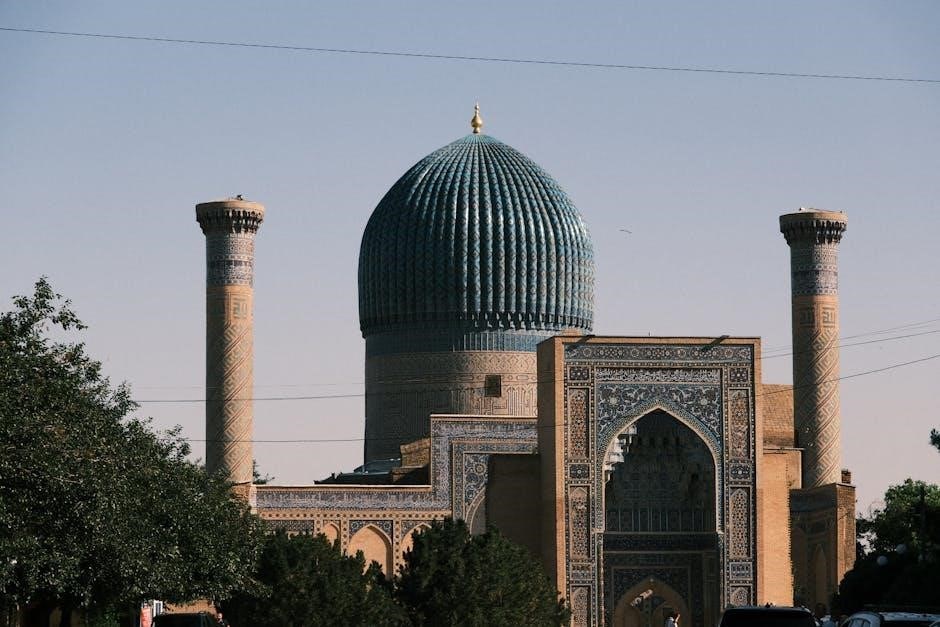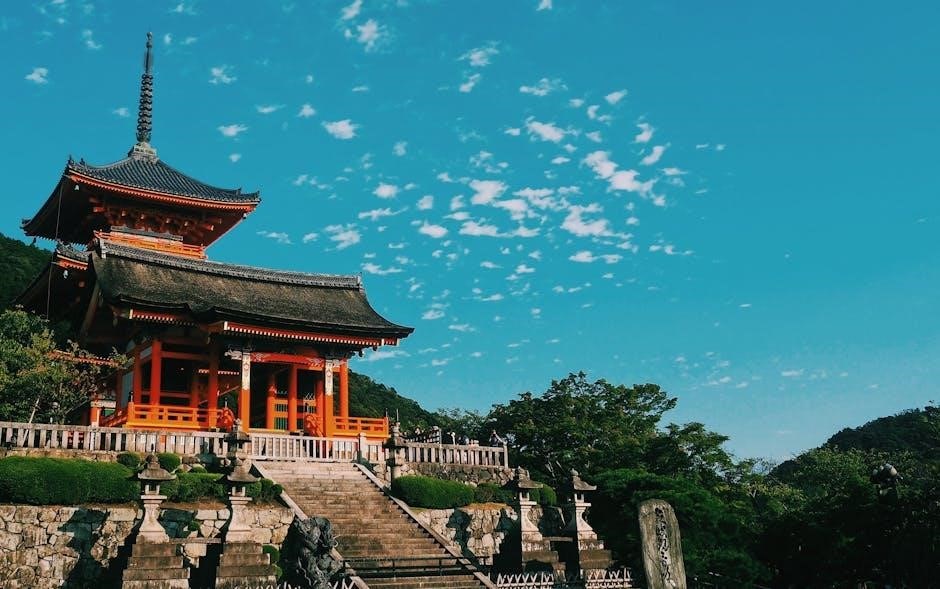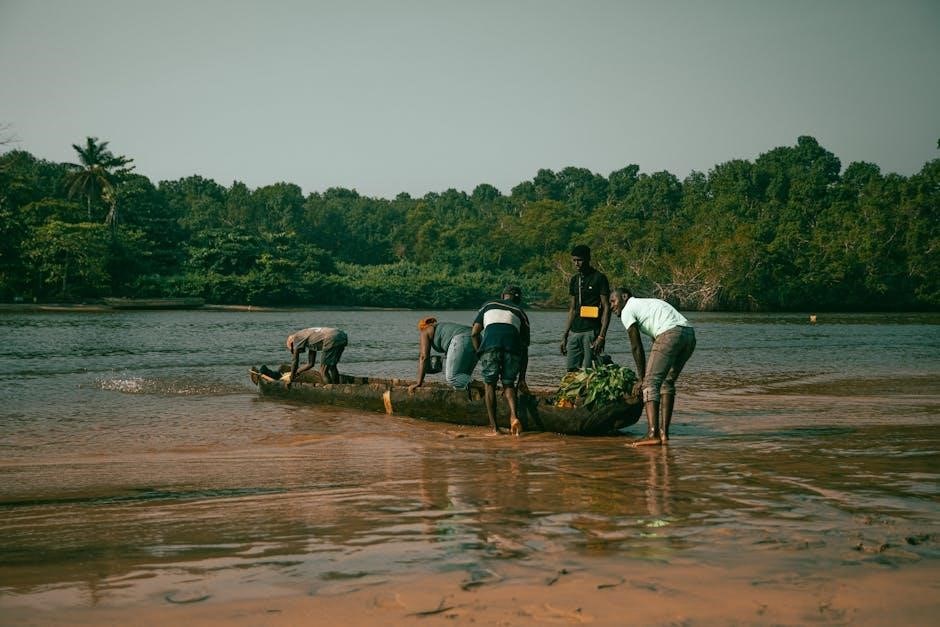Angolan literature reflects the nation’s rich cultural heritage and resilience. Exploring works by writers like Agostinho Neto, José Luandino Vieira, and Pepetela reveals themes of identity, colonialism, and social change.
Overview of Angolan Literary Tradition
Angolan literature is a vibrant reflection of the nation’s history, culture, and identity. Rooted in oral traditions, it evolved during colonial rule, blending African storytelling with European influences. Early writers like Agostinho Neto and José Luandino Vieira laid the foundation, exploring themes of resistance and national pride. Post-independence, authors such as Pepetela and Manuel Rui Monteiro delved into social and political issues. Contemporary writers like José Eduardo Agualusa and Djaimilia Pereira de Almeida continue to innovate, blending tradition with modern narratives. This literary tradition highlights Angola’s resilience, cultural richness, and its people’s enduring spirit. PDF guides and academic papers offer deeper insights into this evolving tradition.
Importance of Exploring Angolan Writers and Their Works
Exploring Angolan writers and their works is crucial for understanding the nation’s cultural identity and historical journey. Through their literature, themes of colonialism, independence, and social change emerge, offering unique perspectives on Angola’s past and present. Writers like Agostinho Neto and José Luandino Vieira provide insights into the struggles and aspirations of the Angolan people. Their works serve as a bridge between tradition and modernity, highlighting the resilience and creativity of Angolan society. By engaging with these authors, readers gain a deeper appreciation for Angola’s literary heritage and its contribution to global culture. This exploration enriches our understanding of African literature as a whole.

Historical Context of Angolan Literature
Angolan literature traces its roots to colonial influences and post-independence struggles, reflecting the nation’s journey through cultural identity, social change, and political transformation, enriching its literary legacy.
Colonial Influence on Early Angolan Writing
Colonial rule deeply shaped early Angolan literature, introducing European literary styles while suppressing indigenous voices. Portuguese colonization imposed linguistic and cultural frameworks, influencing themes of identity and resistance. Writers like Agostinho Neto and José Luandino Vieira emerged during this period, blending African traditions with European narrative structures. Their works often reflected the tensions of colonialism, using literature as a tool for cultural preservation and political expression. Despite censorship, these writers laid the groundwork for a national literary identity, blending local dialects and folklore with formal Portuguese, creating a unique literary landscape that mirrored Angola’s complex colonial experience.
Post-Independence Literary Developments
Following Angola’s independence in 1975, its literature flourished, reflecting the nation’s newfound identity and challenges. Writers like Pepetela and José Eduardo Agualusa gained prominence, addressing social and political issues. Their works often explored themes of national reconstruction, post-colonial disillusionment, and the complexities of modernity. This period saw a diversification of literary styles, blending traditional oral narratives with contemporary forms. The post-independence era marked a cultural revival, with Angolan authors gaining international recognition and contributing to a richer understanding of the country’s history and society. Their writings continue to resonate, offering insights into Angola’s ongoing journey of self-discovery and growth.
Key Literary Movements in Angola
Angolan literature has evolved through distinct movements, reflecting historical and cultural shifts. Early movements were influenced by oral traditions and resistance to colonialism. Post-independence, writers embraced nationalism and social realism, addressing identity and reconstruction. Modernism emerged, blending traditional themes with contemporary styles, while post-modernism introduced experimental narratives. These movements highlight Angola’s literary diversity, from the works of Agostinho Neto to contemporary voices like José Eduardo Agualusa. Each movement captures the nation’s journey, blending heritage with innovation, and continues to shape its vibrant literary landscape.

Notable Angolan Writers
Angolan literature showcases renowned writers like Agostinho Neto, José Luandino Vieira, and Pepetela, whose works profoundly shaped the nation’s poetic and prose traditions, reflecting cultural identity.
Agostinho Neto: The Father of Angolan Poetry
Agostinho Neto, a national hero and Angola’s first president, is celebrated as the father of Angolan poetry. His work, such as Sagrada Esperança, blends political activism with lyrical depth, capturing the nation’s struggle for independence. Neto’s poetry reflects themes of identity, freedom, and the African experience, resonating deeply with his people. His literary legacy endures, influencing future generations of Angolan writers and solidifying his place as a cornerstone of the country’s cultural heritage.
José Luandino Vieira: A Prolific Storyteller
José Luandino Vieira, born in 1935 in Luanda, is a celebrated Angolan writer known for his vivid storytelling and deep connection to local culture. His works, such as A Cidade e a Infância (1957) and A Vida Verdadeira de Domingos Xavier (1961), explore themes of urban life, identity, and social struggles. Vieira’s narratives often focus on the everyday experiences of Angolans, blending humor and satire with poignant realism. His contributions have made him a central figure in Angolan literature, offering insights into the nation’s history and societal challenges through his engaging and relatable prose.
Pepetela: A Leading Voice in Contemporary Literature
Pepetela, born Artur Carlos Maurício Pestana dos Santos in 1941, is a pivotal figure in modern Angolan literature. His works, such as Mayombe (1980) and O Quase Segredo (1988), explore themes of national identity, social justice, and cultural transformation. Pepetela’s writing often blends historical narratives with contemporary issues, offering a unique perspective on Angola’s post-independence challenges. His ability to weave traditional elements with modern storytelling has made him a celebrated author both locally and internationally, cementing his role as a leading voice in Angolan literary circles and a key contributor to the nation’s cultural dialogue.
Manuel Rui Monteiro: Contributions to Modern Angolan Prose
Manuel Rui Monteiro is a distinguished Angolan writer known for his innovative prose and deep exploration of societal issues. His works, such as Quase Sala and Dinamo, delve into themes of identity, urban life, and moral dilemmas. Monteiro’s writing often reflects the complexities of Angola’s post-independence era, blending humor with sharp social critique. His unique narrative style has made him a standout figure in contemporary Angolan literature, offering readers a fresh perspective on the nation’s cultural and political landscape. His contributions continue to resonate, making him a vital voice in modern Angolan prose.
José Eduardo Agualusa: Award-Winning Novelist
José Eduardo Agualusa, born in 1960 in Huambo, Angola, is a celebrated novelist whose works have garnered international acclaim. His novel The Book of Chameleons, winner of the Independent Foreign Fiction Prize, explores identity and memory through a unique narrative style. Agualusa’s writing often delves into Angola’s history, blending historical facts with fictional elements. His prose is both poetic and provocative, addressing themes of colonialism, independence, and the complexities of Angolan society. With works like Creole and A General Theory of Oblivion, Agualusa has solidified his place as a leading voice in contemporary Angolan literature, offering profound insights into the nation’s cultural and historical tapestry.
Kalaf Epalanga: Bridging Tradition and Modernity
Kalaf Epalanga, a prominent Angolan writer, seamlessly merges traditional and modern elements in his works. His novel O Cão e as Suas Sombras (The Dog and Its Shadows) captures the essence of Angolan culture while exploring contemporary themes. Through his storytelling, Epalanga addresses social issues, blending folklore with urban narratives. His unique style resonates with both local and international audiences, making him a key figure in bridging the gap between Angola’s rich heritage and its evolving literary landscape. His contributions highlight the dynamic nature of Angolan literature in the modern era.
Djaimilia Pereira de Almeida: Innovative Narrative Styles
Djaimilia Pereira de Almeida stands out for her innovative narrative approaches in Angolan literature. Her novel Ainda (Still) explores themes of identity, memory, and social dynamics with a unique, fragmented storytelling style. Almeida’s work often blends elements of poetry and prose, creating a distinctive voice that reflects the complexities of contemporary Angola. Her writing challenges traditional norms, offering fresh perspectives on gender, culture, and societal transformation. Through her experimental style, she contributes to the evolution of Angolan literature, making her a significant figure in modern literary circles.

Major Literary Works by Angolan Authors
Angolan literature features diverse works, from poetry to novels, reflecting the nation’s resilience and identity. Notable titles include Sagrada Esperança, A Cidade e a Infância, and O Quase Segredo.
Agostinho Neto’s “Sagrada Esperança”
Agostinho Neto, Angola’s national poet, left an indelible mark with Sagrada Esperança. This collection of poems embodies the spirit of resistance and hope, reflecting Angola’s struggle for independence. Neto’s lyrical voice captures the essence of identity, culture, and the collective aspiration for freedom. His work seamlessly blends personal reflection with political urgency, making it a cornerstone of Angolan literature. Through vivid imagery and profound emotion, Neto’s poetry resonates deeply, offering insights into the nation’s historical journey and its people’s resilience. Sagrada Esperança remains a timeless tribute to Angola’s fight for liberation and self-determination.
José Luandino Vieira’s “A Cidade e a Infância”
José Luandino Vieira’s A Cidade e a Infância is a poignant collection of short stories that capture the essence of childhood and urban life in Angola. First published in 1957, the book offers a vivid portrayal of Luanda’s neighborhoods and the experiences of its young inhabitants. Through rich imagery and nuanced storytelling, Vieira explores themes of identity, culture, and the challenges of growing up in a rapidly changing society. The stories blend humor, nostalgia, and social critique, providing a unique glimpse into Angola’s urban landscape during the colonial era. This work remains a landmark in Angolan literature, celebrated for its authenticity and depth.
Pepetela’s “O Quase Segredo”
Pepetela’s O Quase Segredo is a compelling narrative that delves into Angola’s social and political fabric. This novel explores themes of identity, culture, and societal challenges, offering a nuanced portrayal of life in contemporary Angola. Pepetela’s storytelling weaves humor with critique, creating a rich tapestry of characters and situations. The book reflects his deep understanding of Angolan society, addressing issues like tradition, modernity, and the complexities of human relationships. With its engaging style, O Quase Segredo stands as a significant contribution to Angolan literature, showcasing Pepetela’s mastery of prose and his ability to connect with readers on multiple levels.
Manuel Rui’s “Quase Sala”
Manuel Rui’s Quase Sala is a profound exploration of Angolan society, blending personal narratives with broader cultural and political themes. The novel delves into the complexities of identity, tradition, and modernity, offering a vivid portrayal of everyday life in Angola. Rui’s introspective style captures the nuances of human emotions, while his critique of societal norms resonates deeply. Quase Sala is celebrated for its lyrical prose and its ability to bridge the past and present, making it a significant work in contemporary Angolan literature. The book reflects Rui’s unique voice and his contribution to the nation’s literary heritage;
José Eduardo Agualusa’s “The Book of Chameleons”
José Eduardo Agualusa’s The Book of Chameleons is a mesmerizing exploration of identity, history, and memory. The novel weaves a intricate narrative centered around a man who can change his identity, reflecting the fluidity of human experience. Agualusa’s lyrical prose and non-linear storytelling captivate readers, blending elements of mystery and philosophical reflection. The book delves into themes of belonging and transformation, resonating deeply with Angolan cultural contexts. It has garnered international acclaim, solidifying Agualusa’s status as a leading voice in contemporary African literature. The Book of Chameleons is a testament to his innovative storytelling and intellectual depth.
Kalaf Epalanga’s “O Cao e a Sua Sombras”
Kalaf Epalanga’s O Cao e a Sua Sombras is a captivating narrative that delves into themes of identity, culture, and social dynamics. The title, translating to “The Dog and Its Shadows,” metaphorically explores the complexities of human relationships and societal hierarchies. Epalanga’s work is known for blending traditional Angolan storytelling with modern literary techniques, creating a unique and engaging style. His use of local languages and folklore enriches the text, offering readers a profound connection to Angolan culture. This novel stands as a significant contribution to contemporary Angolan literature, reflecting Epalanga’s ability to bridge tradition and modernity through his writing.
Djaimilia Pereira de Almeida’s “Ainda”
Djaimilia Pereira de Almeida’s Ainda is a groundbreaking work that pushes the boundaries of narrative storytelling; The novel explores themes of identity, memory, and the complexities of human relationships. Almeida’s innovative use of language and structure creates a unique reading experience, blending fragmented narratives with poetic prose. Drawing from Angolan culture and personal experiences, Ainda offers a fresh perspective on contemporary life. This work has been praised for its originality and emotional depth, establishing Almeida as a leading voice in modern Angolan literature. Her ability to experiment with form and content marks a significant shift in literary trends.

Thematic Analysis of Angolan Literature
Angolan literature explores themes of identity, colonialism, independence, and social justice, reflecting the nation’s cultural resilience and its people’s struggles and triumphs through vivid storytelling.
Identity and Culture in Angolan Writing
Angolan writers often explore themes of identity and cultural heritage, blending traditional elements with modern narratives. Works by authors like José Luandino Vieira and Pepetela reflect the nation’s diverse ethnic influences, capturing the essence of Angolan life through vivid storytelling. These narratives frequently delve into the tensions between colonial legacies and post-independence realities, highlighting the struggle to preserve cultural authenticity amidst societal changes. By portraying local customs, languages, and histories, Angolan literature serves as a mirror to the nation’s soul, offering insights into its rich cultural tapestry and the evolving sense of self within its people.
Colonialism and Independence in Literary Works
Angolan literature vividly portrays the nation’s journey through colonialism and independence. Works by Agostinho Neto, José Luandino Vieira, and Pepetela often reflect the struggles of oppression and the quest for freedom. These narratives highlight the psychological and societal impacts of colonial rule, while also celebrating the resilience of the Angolan people. Themes of resistance and liberation dominate, with authors using their writing as a tool to reclaim identity and challenge foreign domination. By exploring these themes, Angolan writers provide a profound commentary on the nation’s historical trajectory and its path toward self-determination and cultural rebirth.
Social and Political Issues in Contemporary Angolan Literature
Contemporary Angolan literature delves into pressing social and political issues, reflecting the nation’s ongoing struggles and aspirations. Themes such as corruption, inequality, and social injustice are prevalent, with writers like Pepetela and José Eduardo Agualusa critiquing systemic flaws. Their works often highlight the disparities between urban and rural life, as well as the legacy of colonialism. By addressing these issues, Angolan authors aim to spark dialogue and advocate for change. Their narratives not only mirror societal challenges but also inspire hope for a more equitable future, making literature a powerful tool for social commentary and transformation in Angola today.

Literary Movements and Styles
Angolan literature embraces modernism and post-modernism, exploring identity and societal issues through innovative narratives. These movements reflect the country’s cultural evolution and its writers’ creative expression.
Modernism in Angolan Literature
Modernism in Angolan literature emerged as a response to traditional forms, embracing experimental styles and themes. Writers like Agostinho Neto and José Luandino Vieira pioneered this movement, blending cultural identity with socio-political commentary. Their works, such as Neto’s poetry and Vieira’s narratives, reflect a shift toward contemporary expression. Modernist Angolan authors explored urban life, colonial impacts, and post-independence realities, creating a bridge between tradition and innovation. This movement marked a pivotal moment in the nation’s literary history, showcasing its unique voice and resilience through creative storytelling.
Post-Modernism and Experimental Writing
Angolan post-modernist literature breaks traditional boundaries, embracing experimental forms and diverse narrative styles. Writers like José Eduardo Agualusa and Djaimilia Pereira de Almeida explore fragmented narratives, blending history, fiction, and cultural identity. Agualusa’s The Book of Chameleons exemplifies this, weaving magical realism with contemporary themes. Similarly, Pereira de Almeida’s Ainda pushes linguistic and structural limits, redefining storytelling. This movement reflects Angola’s dynamic socio-political landscape, offering fresh perspectives on identity, memory, and society. By challenging conventions, these authors enrich Angolan literature, creating works that resonate globally while remaining deeply rooted in local culture and experience.

Contemporary Contributions to Angolan Literature
Modern Angolan writers like Kalaf Epalanga and Djaimilia Pereira de Almeida are reshaping the literary landscape with innovative styles, blending tradition and modernity to reflect evolving cultural identities.
Emerging Voices in Angolan Writing
Emerging Angolan writers are bringing fresh perspectives to the literary scene, often blending traditional themes with modern narratives. Kalaf Epalanga, known for works like “O Cao e a Sua Sombras,” explores cultural identity and societal issues through unique storytelling. Djaimilia Pereira de Almeida, with her innovative style in “Ainda,” delves into personal and collective memories, offering a contemporary voice that resonates with both local and global audiences. These writers are reshaping Angolan literature, ensuring its relevance in today’s diverse cultural landscape.
The Role of Women in Modern Angolan Literature
Women are increasingly shaping modern Angolan literature with their unique voices and perspectives. Writers like Djaimilia Pereira de Almeida, known for her innovative narrative style in “Ainda,” are breaking ground by exploring themes of identity, memory, and societal change. Their works often reflect the complexities of women’s experiences, blending personal and collective histories. This emergence not only diversifies the literary landscape but also challenges traditional norms, offering fresh insights into Angola’s cultural and social fabric. Their contributions highlight the growing influence of women in contemporary Angolan writing, fostering a more inclusive and dynamic literary tradition.

Resources for Exploring Angolan Literature
Discover PDF guides, academic papers, and foundational texts that highlight Angolan writers and their works. Essential resources include “A Literatura Angolana” by Carlos Ervedosa for deeper understanding.
Recommended PDF Guides and Academic Papers
Essential PDF guides and academic papers provide comprehensive insights into Angolan literature. Works like “Vida E Obra de Alguns Escritores Angolano” offer detailed analyses of writers such as Agostinho Neto, José Luandino Vieira, and Pepetela. These resources highlight key literary movements and thematic elements, serving as valuable tools for scholars and enthusiasts. Academic papers on platforms like “A Literatura Angolana” by Carlos Ervedosa delve into the historical and cultural context of Angolan writing. These materials are indispensable for understanding the evolution and significance of Angolan literary traditions, making them a must-read for anyone exploring the subject.
Foundational Texts for Understanding Angolan Literary History
Foundational texts like Agostinho Neto’s “Sagrada Esperança” and José Luandino Vieira’s “A Cidade e a Infância” are pivotal for grasping Angolan literary history. These works reflect the nation’s journey from colonialism to independence, capturing the essence of cultural identity and social transformation. Pepetela’s “O Quase Segredo” and Manuel Rui Monteiro’s “Quase Sala” further enrich this understanding, offering critiques of societal structures and exploring modern Angolan realities. These texts, along with others by José Eduardo Agualusa and Kalaf Epalanga, provide a cohesive narrative of Angola’s literary evolution, making them indispensable for scholars and readers alike.
